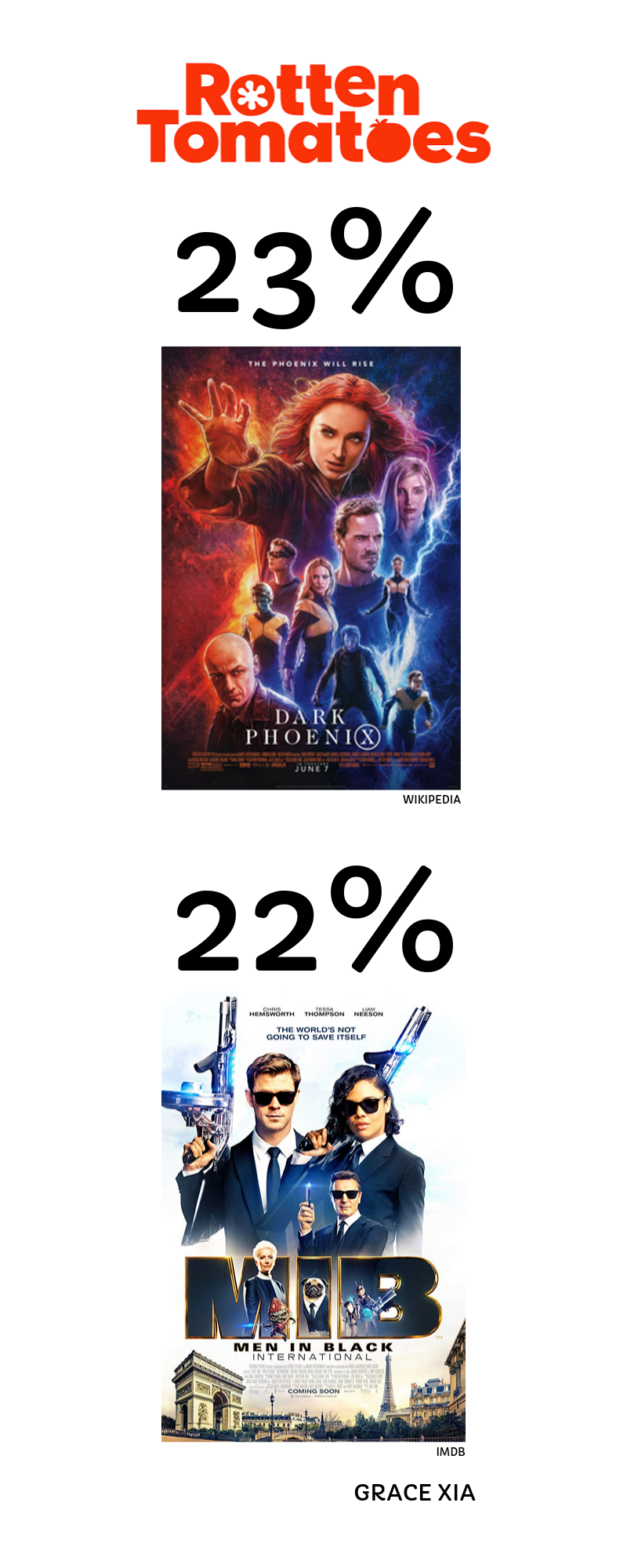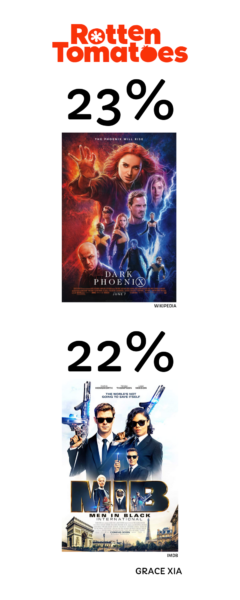
This past summer delivered some particularly atrocious movies.

“X-Men Dark Phoenix,” the latest installment in the X-Men franchise, is a great example of a newly loathed film. Despite the success of “Deadpool,” “Dark Phoenix” flopped. Its first weekend at the box office was a bad omen of the criticism to come. It only brought in $33 million on its first weekend, the worst opening weekend in the X-men franchise. Critics ripped it to shreds, with Rotten Tomatoes giving it only a 23 percent rating.
On paper, the plot sounds good. The protagonist, Jean Grey, played by Sophie Turner, is a mutant with telepathic and telekinetic powers. At a young age she can’t control her strength, causing her to kill her mother in a car accident. She is given up to Professor X, who teaches her how to control her powers.
“The progression of the plot felt choppy and the aliens made extremely boring villains”
Years later, Jean Grey goes on a mission in space, where she is hit by the phoenix power and miraculously survives. The strength of her new power releases memories of her traumatic past, and she becomes dangerous. She runs away, and a group of aliens who wish to use her power to restore their race promptly seduce her. When she reunites with the mutants, Jean uses her phoenix powers to destroy the aliens, merges with the phoenix power and ascends to the skies to become a great celestial force.
The epic tale of Jean Grey absorbing the phoenix power is beloved by comic fans, making the film’s feeble delivery all the more disappointing. Many of the characters, such as Cyclops and Storm, lack any personality aside from being convenient plot devices. Even Sophie Turner’s portrayal of Jean Grey felt bland.
The progression of the plot felt choppy and the aliens made extremely boring villains. Without sympathetic motives or semblance of personality, they proved to be additional plot devices.
“It was as if the Riverdale writers wrote this movie,” said sophomore Penelope Hart.
The movie does have redeeming qualities. James McAvoy’s portrayal of Professor X is fresh and thought-provoking. Sophie Turner does manage to give a raw, heart-breaking performance at more intense moments. The cinematography and special effects were also commendable. However, to audiences and critics alike, these qualities just weren’t enough.
“The trailers made it seem like it was going to be an epic film that expanded on the X-Men universe a lot,” Hart said. “But the plot just felt forced and the characters didn’t feel real. I was really disappointed with it.”
“Dark Phoenix” wasn’t the only franchise sequel that fell short of expectations.
“Men in Black: International” seemed promising. Audiences expected Chris Hemsworth and Tessa Thompson to have great on-screen chemistry due to their roles in “Thor: Ragnarok.” However, this duo could not compensate for the movie’s lack of substance.
“There were genuinely amusing moments, but most of those were quickly shrouded by absurdity”
Taking place on an Earth secretly full of visiting aliens, Molly, played by Thompson, encounters an alien when she is a child, leading her to become a member of Earth’s alien agents, or Men in Black. Now Agent M, she meets Agent H, played by Hemsworth. The two pair off on a mission where mysterious shape-shifting alien twins fight them, then disappear. M also obtains a peculiar crystal, later revealed to be an extremely powerful harnessed star. The struggle for the crystal leads to a battle in which the twins show up again. However, they are promptly killed by the Men in Black. H and M realize that the twins were trying to get the crystal to protect their alien race, not to hurt humans. They discover that the Men in Black had been infiltrated with an evil alien mole. The two then save the day.
The writing in this movie was so lackluster that Thompson and Hemsworth struggled to pull it of. Now and then there were genuinely amusing moments, but most of those were quickly shrouded by absurdity. The characters had little to no development, and the movie wasn’t funny enough to get away with its random plot. Rotten Tomatoes had another field day with this movie, awarding it 22 percent.
Perhaps Hollywood can learn a lesson from the failures of this summer’s movies — maybe it’s time to stop writing bad sequels.



